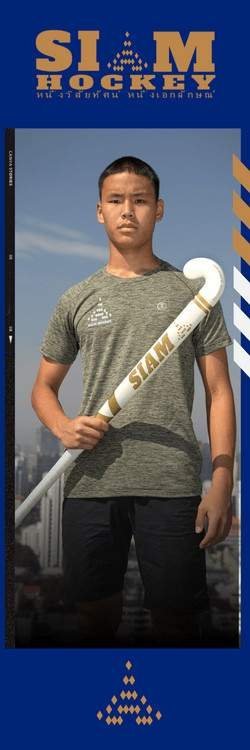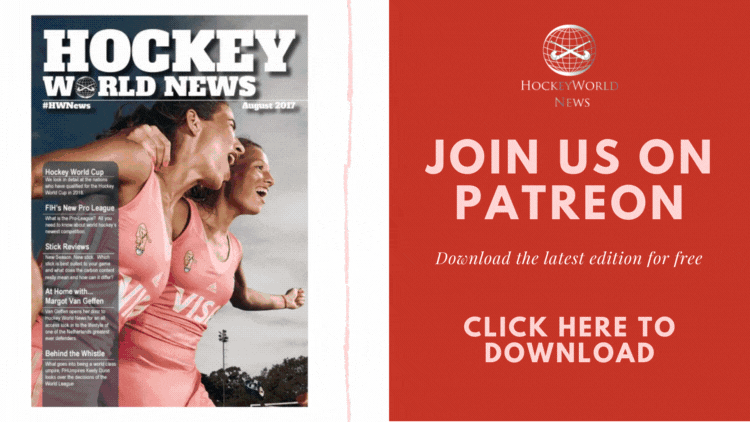During his time as a professional hockey player in Germany and a member of Ireland’s national team, Matthew Bell was diagnosed with a cancerous brain tumor in 2019. After a long treatment and his fight to overcome all the hurdles caused by the disease, Matthew has decided to document his story in a book – “Second Chances” – that recounts his battle for recovery and his extraordinary comeback to hockey. It is an inspirational story about resilience, hope and positive mental attitude.
Matthew, you found out about your disease through your own hockey performances that were declining. What were the issues that you experienced on the field of play?
I was diagnosed in September 2019, but in June of that year my grandfather sadly passed away and around that time I was waking up with migraines and vomiting. At the same time, I was playing with the national team, but I could barely stop or pass the ball. My eyesight was causing a lot of issues and that was affecting my performances. Then I moved over from Crefelder HTC, Germany to KHC Dragons, Belgium but the Belgian side sent me back to Germany because they expected a higher level of player. Back in Crefeld, I had two dizzy spells within a week. I spoke to my manager whose husband is a doctor and he organized for me an MRI (on a Friday the 13th …) that revealed a tumor of the size of three golf balls in my midbrain. I had to be taken straight to hospital because the doctors could tell from the pressure that I was a day away, if not sooner, from having a brain hemorrhage. If I hadn’t had the surgery immediately, I wouldn’t be standing here today.
You were a professional player in Germany at the time. What can you tell us about the reaction of the club, your teammates, the fans and also your teammates from the national team?
I didn’t make it to the European Championship in August with the Irish team which was a bit of a shock because it was the first tournament that I hadn’t been selected for in a number of years. So I received a lot of questions about that and I didn’t reply because I was very ashamed. But then obviously the news broke of my brain tumor and the messages of support just came flooding in from all areas – Germany, Belgium, Belfast, Banbridge. My teammates from all over Europe were sending messages and there was a period when I couldn’t use my phone as I was so immobile and lying in a hospital bed. My dad was replying to messages for me. I eventually did get back to my phone and started replying to messages, but it took me a very long time. So, yes, the hockey community has been amazing over the last couple of years in helping me through my recovery. When I was at hospital, people came to visit me every single day, which obviously makes your time there a lot easier!
What part did hockey and the hockey family play in your recovery process?
To represent your country and play professionally abroad, you have to have an elite mental attitude. If you don’t get selected for a team, you need a positive attitude to bounce back from that. This definitely helped me throughout the time of going through my treatments and recovery. Having to learn how to walk, talk and eat again from scratch, that positive attitude was a big help. I’m also lucky to have a positive family behind me and really supportive friends. They helped me a lot to get through that period of time.
During your recovery did you have in mind to play hockey again?
When I left hospital, I said to my dad that I wanted to play a hockey match by the end of the season. We were in April. He laughed at me and said ‘you’re being too ambitious’ because at this point I had just started to walk without any crutches. I didn’t realize how badly my body was affected and it wasn’t until nearly two years after that that I played my first match again.
What have been the hurdles you had to overcome to get back onto the hockey pitch?
I was in a wheelchair for two months. I was on a rollator for 6-7 weeks. Then I was on a single crutch for a while. My balance was badly affected. My eyesight was badly affected too and is still not back to 100%. It took a year after my diagnosis for me to get onto a hockey pitch again, at my home club in Banbridge. My dad said to me after that day: ‘I didn’t think I’d ever see you run again!’. Let alone he didn’t think he’d ever see me play a hockey match again. So, yes, I couldn’t count the obstacles and hurdles on two hands. However, at each training session and at each match, things improve. My mobility around the pitch gets better and better. But I’m a very impatient person and it’s not fast enough for my liking!
Is it important for you to get back to the level you had before your disease or is the most important focus today simply to enjoy playing and meeting friends?
I always had the ambition of going to Paris in 2024. I missed the Olympic qualifier in 2019 in Canada because I was in hospital. I’ve always aspired to play at the Olympics. I was lucky enough to win a European bronze medal in 2015 and to be at the World Cup in 2018. So I always will have in my head that I want to be back in the national team. But it did take some time for me to realise that I will probably never be at that level again. I currently play for our third team at Banbridge hockey club. Different people in the club told me that even though I can’t play at the same level, I can pass down my knowledge and ideas to other members in the club and help them improve. If I can do that, then at least it’s benefitting the club and the sport. I’m able to stand on a hockey pitch, play and coach which I think is the main thing because I was very close to not being here today.
But in the back of your mind, do you still see a small possibility to go back to the national team?
It’s always in the back of my head obviously. That’s always going to be a dream. I think if anyone who was in my position said it wasn’t, they would be lying. My end goal is to be back in the national team and competing and training to go to Olympics and World Cups. That’s very far away but it’s always in the back of my head that I want to get there.
How did you come to the idea of writing a book about your story?
When I was going through my recovery, I watched a YouTube video of a police officer from Northern Ireland that suffered a brainstem stroke and documented her recovery process. I couldn’t believe how similar our recoveries were. Then I noticed she had written a book so I messaged her on Instagram and she sent me her book. I read it within two days. Then I decided to document my own recovery. Numerous people have told me that my recovery is inspirational. So I thought: if I write a few words and it helps one person, then it’s beneficial. If I do 100 interviews and it helps one person, then it’s worthwhile. If I can get a book out and it helps one person, then that’s amazing. Furthermore, the book profits are going to the cancer charity where I stayed for my cancer treatment. So that’s also a big positive.
What is the main intention of the book, Matthew?
It’s a good question. I think it is to make people aware that if something isn’t right with yourself, you should go and get it checked out! My mum had a doctor’s appointment booked for me around the time of my grandfather’s passing when I was waking up with the migraines and vomiting. But I went away with the Irish team and my symptoms stopped, so I told Mum to cancel the doctor’s appointment. I just wonder, if I had attended that doctor’s appointment, would I have been as badly affected?
The profits of the book will go to the charity “Friends of the Cancer Centre”. Why this charity in particular?
Because I was in their hospital for four months. They provided my cancer treatment and removed the cancer from me. So I thought it was just a nice token to be able to give them some money from the book, hopefully, for being so good to me when I was in hospital and working so hard with me to get me back on my feet after I was bedbound for so long. The physios and the occupational therapists worked with me for weeks and weeks to get me back on my feet and I can’t ever repay them. But if I can give back benefit to the charity in some way, then that’s a positive thing.
How do you look back at this whole period of your life?
It’s weird because obviously I’m very thankful to still be standing here today and that’s down to the people in Germany and the doctors there that stopped me from having that brain hemorrhage, by providing me with that emergency surgery. So I’m just thankful to be alive today and to be able to stand on the hockey pitch and play and coach. Before I became ill, I would have said hockey was the biggest thing in my life whereas now I would say family and friends are. Maybe I took them for granted before, but I won’t take them for granted again after the way they helped me throughout my recovery.
*****
“Second Chances”, the book written by Matthew Bell, is available at https://excaliburpress.co.uk/product/second-chances-by-matthew-bell/
By FIH








